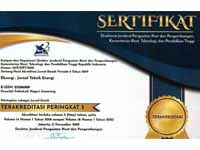Design and Simulation of Asynchronous Buck Converter using Fuzzy Logic Controller (FLC)
DOI:
https://doi.org/10.32497/eksergi.v20i02.5804Keywords:
Asynchronous Buck Converter, MPPT, Fuzzy Logic Controller, Solar Panel, Output PowerAbstract
Currently, Indonesia's energy is running out and
has received serious attention so the Government targets that
by 2050 the role of renewable energy will be at least 31%. This
encourages the production of various alternative energy
sources that are environmentally friendly and available, such
as solar power plants. However, solar intensity and a dynamic
environment strongly influence the output power generated by
solar panels. So in this research, an asynchronous buck
converter design using MPPT will be made to track the
maximum power point of solar panels with the fuzzy logic
controller method which will be applied to Monocrystalline
solar panels with a capacity of 300WP. Fuzzy MPPT will adjust
the duty cycle by PWM Arduino Nano on the asynchronous
buck converter to keep reaching the maximum power point.
The results show that the developed system can increase power
conversion efficiency and maintain output voltage stability
under various operational conditions. The implementation of
FLC as MPPT on Asynchronous Buck Converter successfully
optimizes the power absorbed from solar panels, thus
supporting the reduction of electrical energy consumption from
PLN in the Jakarta Global University student association
secretariat building. This implementation is expected to be a
reference for the implementation of a smarter and more
sustainable energy management system in the future.
Downloads
Published
Issue
Section
License
Authors who publish with this journal agree to the following terms:Authors retain copyright and grant the journal right of first publication with the work simultaneously licensed under a Creative Commons Attribution License that allows others to share the work with an acknowledgement of the work's authorship and initial publication in this journal.
Authors are able to enter into separate, additional contractual arrangements for the non-exclusive distribution of the journal's published version of the work (e.g., post it to an institutional repository or publish it in a book), with an acknowledgement of its initial publication in this journal.
Authors are permitted and encouraged to post their work online (e.g., in institutional repositories or on their website) prior to and during the submission process, as it can lead to productive exchanges, as well as earlier and greater citation of published work (See The Effect of Open Access).






